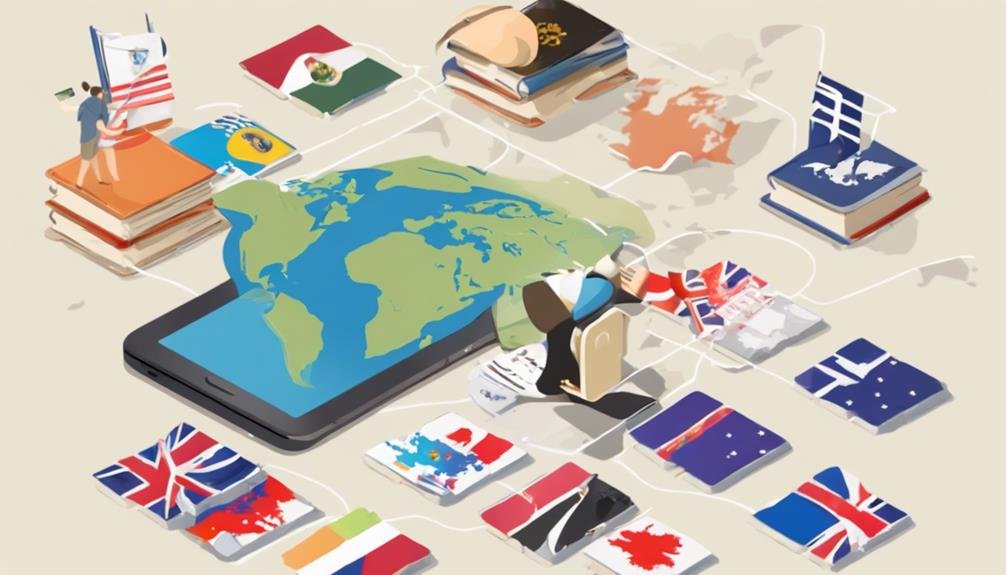When Sarah moved to Japan for a new job opportunity, she struggled to adjust to the cultural differences she encountered daily. One effective strategy she tried was attending local cultural workshops to learn traditional customs and etiquette. By immersing herself in these experiences, she gained a deeper understanding of the Japanese way of life and formed meaningful connections with locals. How can you effectively navigate cultural adjustments in a foreign environment to thrive and succeed in your expat journey?
Key Takeaways
- Acknowledge the shift in identity and values for personal growth.
- Embrace new interests and priorities to integrate into the new culture.
- Enhance language proficiency through classes and practice groups.
- Engage in diverse activities for social connections and well-being.
- Build support networks with expats and locals for shared experiences.
Acknowledge the Shift in Identity
Acknowledging the shift in identity is essential for expatriates to navigate the complexities of cultural adaptation and foster personal growth during international assignments.
Cultural adjustment is pivotal in expat adjustment, influencing how individuals perceive themselves and interact with new environments. Understanding the impact of cultural adaptation on personal growth is paramount for expatriates seeking to thrive in unfamiliar settings.
When shifting to a new cultural context, expatriates often undergo a transformation in roles, priorities, and self-perception. This change in identity can lead to a profound reevaluation of one’s values, beliefs, and goals, facilitating personal growth and development.
Embrace New Interests and Priorities
For expatriates seeking personal growth and integration into their host country’s lifestyle, embracing emerging interests and adjusting priorities is key to adapting successfully to a new cultural environment. Acknowledge and embrace the changes in interests and priorities that may arise during international assignments. Recognize the potential shift in identity and routines that can lead to personal growth and development.
Creating space for exploration and adaptation to new interests can enhance the expat experience. Engage in activities that align with evolving priorities to foster a sense of fulfillment and purpose. Embracing new interests and priorities can facilitate cultural adaptation and integration into the host country’s lifestyle.
Enhance Language Proficiency

To enhance your language proficiency as an expat, consider enrolling in language classes tailored for foreigners. These classes can provide structured learning and cultural insights.
Engaging in immersive cultural experiences, such as local festivals or community events, can also deepen one’s understanding of the language in context.
Joining conversational practice groups offers a supportive environment for honing your speaking skills and building confidence in real-life scenarios.
Language Classes for Expats
Enhancing your language proficiency through group language classes as an expat is essential for fostering confidence, socialization, and skill development in your new cultural environment. By actively engaging in group language classes, you create opportunities to practice the local language while socializing with other expats.
Developing conversational fluency in the local language is key to effective communication, facilitating successful integration during your expatriate assignment. Dedication to learning and practicing the local language can enhance your ability to communicate effectively in various social and professional settings.
Embracing language classes motivates you to improve your communication skills and provides a solid foundation for maneuvering and thriving in your host country’s cultural landscape.
Immersive Cultural Experiences
Immersive cultural experiences provide expats valuable opportunities to enhance their language proficiency through practical application in real-life situations. Language immersion programs in the host country offer intensive exposure to the local language, accelerating learning and fluency.
Expats can practice their language skills in authentic settings by participating in cultural activities and events, reinforcing their understanding and usage. Living with a host family further deepens cultural knowledge and language acquisition through daily interactions and immersion in local customs.
Engaging in cultural exchanges with locals not only aids in language improvement but also provides insights into traditions, customs, and communication nuances, enriching the expat’s overall experience and integration into the new cultural environment.
Conversational Practice Groups
Conversational practice groups can greatly enhance language proficiency through real-life interactions and consistent speaking practice. Participating in these groups allows you to immerse yourself in a new cultural environment, which can help you better understand cultural differences and integrate into the local community. Conversing with native speakers improves your language skills and deepens your cultural awareness.
The supportive setting of these groups allows you to practice speaking confidently and receive immediate feedback. Additionally, being part of such a group fosters social connections and provides a network of peers dedicated to language practice. Embracing conversational practice, groups can make your language learning experience more interactive and enjoyable while accelerating your proficiency.
Engage in Various Activities

Participating in various activities is essential in facilitating expatriate cultural adjustment by fostering social connections and providing cultural immersion and learning opportunities.
Engaging in diverse activities helps establish new social connections and aids in building a deeper understanding of the host culture. By participating in local events, hobbies, and community activities, expatriates can immerse themselves in the customs and traditions of their new environment, thus expediting the cultural adjustment process.
Additionally, pursuing personal interests and hobbies is a healthy distraction from homesickness, contributing to positive mental well-being. Continuous engagement in various activities also enhances adaptability and resilience, which are important for dealing with cultural adjustment challenges.
Hence, actively involving yourself in various activities is a proactive strategy that can greatly support your cultural adjustment journey.
Build Support Networks
To enhance your cultural adjustment process as an expatriate, establishing support networks abroad is essential for fostering a sense of connection and reducing feelings of isolation in a new cultural setting.
Connecting with other expatriates can provide a sense of community and shared experiences, aiding in cultural adjustment. Additionally, developing friendships with locals in the host country can offer valuable insights into the new culture, helping you feel more integrated and understood.
Engaging in social activities and events allows you to network and provides opportunities to form meaningful relationships with expats and locals. Connecting with others in your local community opens you to diverse perspectives and experiences, making the cultural adaptation process smoother and more enriching.
Embracing these support networks will help you navigate the challenges of living in a new country and contribute to a fulfilling and well-rounded expat experience.
Staexpatn-Minded and Curious

Remaining receptive and inquisitive towards unfamiliar customs and beliefs encountered in a foreign culture is key for expats to navigate and experience their new environment effectively. Being open-minded allows you to embrace the latest perspectives, behaviors, and customs you encounter, fostering flexibility in adjusting to unfamiliar social norms. Curiosity encourages you to actively seek to understand and appreciate the cultural nuances and differences you experience, enabling deeper cultural integration and enhanced cross-cultural communication. Cultivating a curious mindset empowers you to engage with locals, ask questions, and learn from diverse cultural interactions. Check out the table below for a quick overview of how staying open-minded and curious can enhance your cultural adjustment process:
| Benefits of Being Open-Minded and Curious in a New Culture |
|---|
| Embracing new perspectives and behaviors |
| Fostering adaptability in adjusting to unfamiliar customs |
| Engaging with locals and learning from diverse interactions |
| Enhancing cross-cultural communication and integration |
Conclusion
In summary, effective expat cultural expat strategies are like a compass guiding you through uncharted territory. By acknowledging the shift in identity, embracing new interests, and enhancing language proficiency, you can confidently navigate the complexities of a new culture.
Engaging in various activities, building support networks, and staying open-minded are essential in your cultural adjustment toolkit. Remember, like a compass, these strategies will help you find your way in this new cultural landscape.
FAQs
1. What Is the Five Stage Adjustment Process of an Expatriate?
The five-stage adjustment process of an expatriate involves Preparation, Honeymoon, Culture Shock, Adaptation, and Repatriation. Each phase presents unique challenges and chances for personal growth. Understanding and preparing for these stages is important for a successful expatriate experience.
2. What Are the 4 Stages of Cultural Adjustment?
Experiencing cultural shock and overcoming it is a pivotal part of adapting to a new environment.
Language barriers may pose initial challenges, but communication will become smoother as you work on adaptation.
Social integration and networking play essential roles in fostering a sense of belonging.
Developing emotional resilience and coping strategies will aid in moving through the different stages of cultural adjustment.
3. What Are the Strategies for Improving Expatriate Success?
To improve expatriate success, focus on strategies such as:
- Cross-cultural training
- Language immersion
- Networking
- Cultural sensitivity
- Integration
- Adaptation
- Resilience building

